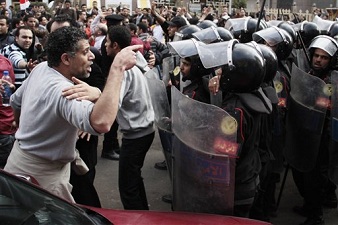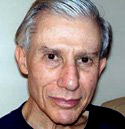Egypt's Revolution: Obama Backing Regime Change?

In July 2003, a USAF Institute for National Security Studies report [.pdf] titled, "Egypt as a Failing State: Implications for US National Security" suggested
"Mubarak's traditionally autocratic and oppressive short-term fixes" weren't working. As a result, "the possibility of unrest is real; with the correct confluence of domestic, regional, and international events, Egypt can quickly be added to the list of failed states....This paper (thus) contends that (the appearance of) democracy is a security imperative for the post-9/11 world."
In its July/August The Failed States Index 2010, ForeignPolicy (FP) ranked nations under five categories: critical, in danger, borderline, stable and most stable. Ranked 49th among 177 countries evaluated, FP called Egypt a failed state "in danger." It scored lowest in three "delegitimization" categories because of:
● endemic corruption, including ruling elite profiteering;
● human rights violations; and
● an accumulation of "grievances," including poverty and unemployment among others.
Not least of its woes is an aging, ill, despotic ruler. Washington perhaps wants the appearance of a kinder, gentler replacement, the pretense of change continuing old policies. If so, it won't be the first time as a previous article explained, accessed through this link.
Changed Washington Rhetoric
On January 30, Reuters said
"Obama voiced support for an 'orderly transition' in Egypt that is responsive to the aspirations of Egyptians in phone calls with foreign leaders, the White House said on Sunday."
His rhetoric mentioned opposing violence, showing restraint, supporting universal rights, peaceful assembly and association, and free speech, what, in fact, Washington disdains globally, including at home.
Also on January 30, New York Times writer Mark Landler headlined, "Clinton Calls for 'Orderly Transition' in Egypt," saying she
"called (for) a more politically open Egypt, stopping short of telling (Mubarak) to step down but clearly laying the groundwork for his departure." In fact, she suggested Washington wants him out. He'll get time to go, and aid will continue, despite January 28 White House comments saying it was under review.
In its January 28 editorial headlined "Washington and Mr. Mubarak," The Times suggested support for regime change, calling him
"arrogan(t) and tone-deaf, (meeting) spiraling protests with spiraling levels of force and repression, (as well as showing) more....weakness than strength (by) shut(ting) down Internet access and cellphone service."
The Times has a longstanding history of supporting wealth, power, and imperial interests. It's also Washington's lead voice, so excoriating Mubarak suggests official administration policy, meaning his time has passed - gracefully if cooperative, violently if not, but one way or other he's gone.
On January 29, Haaretz headlined "Sacking Egyptian ministers not enough, US State Department says," quoting spokesman PJ Crowley saying:
"The Egyptian government can't reshuffle the deck and then stand pat. President Mubarak's words pledging reform must be followed by action," stopping short of endorsing his departure but signaling that resolution if he hasn't left in due course.
Jimmy Carter teaches Sunday School at Marantha Baptist Church, Plains, GA. On January 30, he told parishioners and guests, Mubarak "will have to leave. This is the most profound situation in the Middle East since I left office," suggesting, of course, Iran's 1979 Islamic Revolution ousting Shah Mohammad Reza Pahlavi, replacing him with an Islamic republic under Ayatollah Ruhollah Knomeini.
On January 31, Al Jazeera headlined, "Mubarak swears in new government," saying:
"Three former senior officers are included in the line-up, suggesting a strong security presence in the new government."
Appointments included Mahmoud Wagdi as new interior minister. A retired police general, he previously headed Cairo's criminal investigations department and state prisons. A new deputy prime minister, finance minister and trade minister were also named.
Retaining their posts were Foreign Minister Ahmed Abul Fheit and Defense Minister General Mohamed Hussein Tantawi.
Protesters were unimpressed, AFP reporting they'll:
"accept no change other than Mubarak's departure. We want a complete change of government (under) a civilian authority," they demanded.
Egyptian Security Forces Back on Streets
Police and Central Security Forces (CSF) are again deployed after letting army troops alone patrol streets. Evidence, in fact, suggested they were involved in looting, robberies, jailbreaks, violence, and break-ins into upscale neighborhoods to create instability, trying to blame protesters and undermine Mubarak's regime. Reportedly, he instructed military troops to shoot to kill if necessary. So far, they've shown restraint.
On January 31, Al Jazeera headlined, "Egypt protesters increase pressure," saying:
Protesters called for massive Tuesday demonstrations. "The so-called April 6 Movement said it plans to have more than a million people" in Cairo streets "as anti-goverment sentiment reaches a fever pitch." [...] Thousands were back out Monday. "Protesters say they'll stay (there) as long as Mubarak (remains) in power." They're unimpressed with new appointments and pledges, calling them "too little, too late."
On January 31, a Lebanon Daily Star editorial titled, "Egypt's battle requires focus," said:
"....the rest of the world should stay out of the drama that is unfolding in the land of the Nile, and avoid provoking the situation. Decades of double standards based on support for anti-democratic regimes, under the pretext of security, cannot be erased with breathless exclamations of support for 'the people.' "
Czech writer Milan Kudera once said
"The struggle of people against power is the struggle of memory against forgetting."
Global despots are puppets taking orders from Washington, suppressing their people as directed. For generations, America waged war on democracy and truth at home and abroad. After WW II, it was global, today enforced with high-tech military power able to strike targets anywhere with overwhelming force in short order, or deploy quickly on homeland streets to preserve order or crush dissent.
Rhetoric aside, morality, good intentions, high-mindedness, and freedom aren't part of America's agenda - just money power, military strength and global dominance. It's been that way for decades.
H.L. Mencken on America's Sham Democracy
In 1926, acerbic political critic H.L. Mencken's "Notes on Democracy" called it farcical, excoriating "mobmen" who extol it while supporting tyrants, offering thoughts like:
"What is worth knowing he doesn't know and doesn't want to know; what he knows is not true. The cardinal articles of his credo are the intentions of mountebanks; his heroes are mainly scoundrels." [...] "The average American doesn't want to be free. He simply wants to be safe." [...] "I have alluded somewhat vaguely to the merits of democracy. One of them is quite obvious: it is, perhaps, the most charming form of government ever devised by man. The reason is not far to seek. It is based upon propositions that are palpably not true - and what is not true, as everyone knows, is always immensely more fascinating and satisfying to the vast majority of men than what is true. Truth has a harshness that alarms them...."
Irreverent, refreshingly politically incorrect, and as relevant now as then, he eviscerated a sacred cow, with comments like "Shall we make the world safe for democracy?" To the contrary, "The world should be made safe from democracy!" - meaning the bogus kind America espouses.
He accused politicians of
"shov(ing)" "plain people" into war, and will "shove (them) into the next one." [...] "The whole aim of practical politics is to keep the populace alarmed by menacing it with an endless series of hobgoblins, all of them imaginary." [...] "The urge to save humanity is almost always only a false-face (to) rule it."
Mencken believed in liberty. Today he'd excoriate Washington for denying it to so many. Also its hypocrisy, with comments like
"It is the theory of all modern civilized (US-type) governments that they protect and foster the liberty of the citizen; it is the practice of all of them to limit its exercise, and sometimes very narrowly."
He also called (US-style) governance "organized exploitation," preaching high-mindedness while practicing state terrorism, brutishness, intolerance, and authoritarian control, globally today like Mencken couldn't have imagined.
Prospects Ahead for Egypt
Below are variations on Stratfor founder George Friedman's four possible outcomes:
(1) Mubarak achieves stability and survives, or more likely, a senior military official or cabal replaces him.
(2) ElBaradei or someone like him becomes president, offering a facade of democracy.
(3) The Muslim Brotherhood is empowered with a moderate Islamist agenda, posing no threat to dominant Western interests, cooperating instead to keep power.
(4) Egypt becomes chaotic. Elections produce gridlock. No viable candidate emerges. Instability continues.
Odds are Mubarak will leave, and stability will return under a new regime, very much subservient to Washington like all other global despots wanting to go along to get along, or put another way - survive long enough to enjoy power and related privileges.
A Final Comment
TE Lawrence (of Arabia) once promised Arabs independence and democracy for their support in WW I. They're still waiting.
___________________________________________________________________________________

Stephen Lendman: I was born in 1934 in Boston, MA. Raised in a modest middle class family, attended public schools, received a BA from Harvard University in 1956 and an MBA from the Wharton School at the University of PA in 1960 following 2 years of obligatory military service in the US Army. Spent the next 6 years as a marketing research analyst for several large US corporations before becoming part of a new small family business in 1967, remaining there until retiring at the end of 1999. Have since devoted my time and efforts to the progressive causes and organizations I support, all involved in working for a more humane and just world for all people everywhere, but especially for the most needy, disadvantaged and oppressed. My efforts since summer 2005 have included writing on a broad range of vital topics ranging from war and peace; social, economic and political equity for all; and justice for all the oppressed peoples of the world like the long-suffering people of Haiti and the Palestinians. Also co-hosting The Global Research News Hour, occasional public talks, and frequent appearances on radio and at times television.
Stephen Lendman is a Research Associate of the Centre for Research on Globalization. He lives in Chicago and can be reached at lendmanstephen@sbcglobal.net. Also visit his blog site sjlendman.blogspot.com and listen to The Lendman News Hour on RepublicBroadcasting.org Monday - Friday at 10AM US Central time for cutting-edge discussions with distinguished guests on world and national issues. All programs are archived for easy listening.
___________________________________________________________________________________
URL: http://www.a-w-i-p.com/index.php/2011/02/01/egypt-s-revolution-obama-backing-regime
























